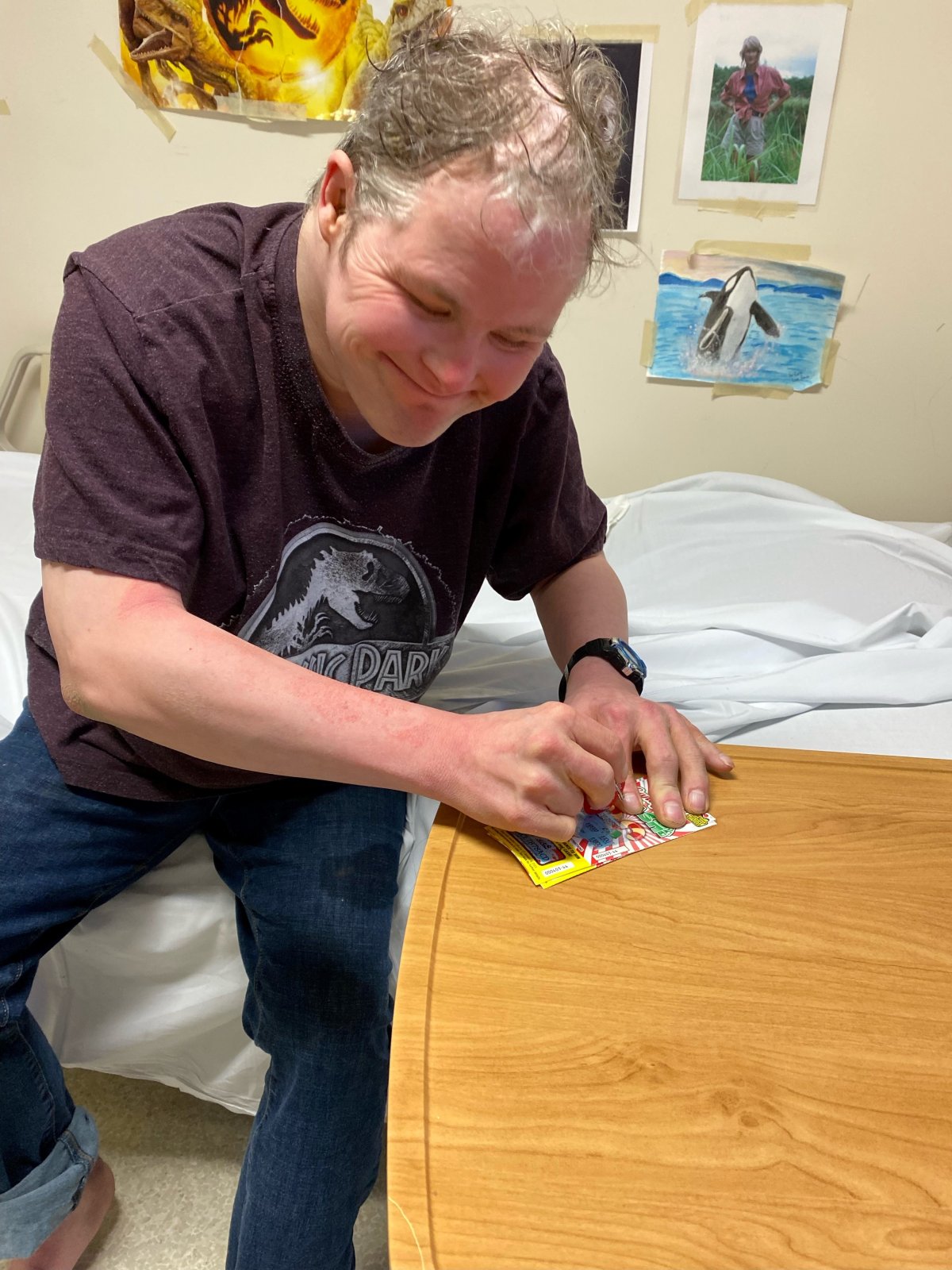An earlier version of this story said Cory had been in hospital since July 2022 for a total of seven months. He’s been in hospital since June 2022 for a total of eight months.

Cory Kadlec has been in hospital so long, his family said, his health isn’t getting better, it’s getting worse.
He’s been in a hospital in Saskatoon since June 11, 2022, after he had a seizure, according to his sister Tara Jo.
She told Global News Cory has Down Syndrome, diabetes, celiac disease, Stage 2 dementia, a thyroid issue and suffered a stroke in 2020.
Cory and his family say the long hospital stay is hurting his recovery. He can’t spend time with friends and live the independent life he is capable of living. They said his mental health is deteriorating.
Cory wants to return to a care home, like one he lived at before he had the seizure. But care homes said they can’t accommodate Cory’s complex health needs, the family says.
According to his family, the only option the Saskatchewan Health Authority (SHA) and Ministry of Social Services (MSS) offered is even worse – a long-term care dementia ward.
‘There’s no way my brother will survive in there mentally,” Tara Jo said, speaking from her home in Calgary. “Not one minute.”
She said the other patients in the long-term care (LTC) facility have late-stage dementia that is much worse than Cory’s early-stage affliction.

According to the Alzheimer’s Society of Canada, patients with early-stage dementia can have difficulties communicating and forget things but “retain many of their abilities” whereas people with mid- and late-stage dementia may require “(a)ssistance with daily tasks,” such as dressing and using the bathroom, and can require care 24 hours a day.
Tara Jo said Cory does need access to round-the-clock care, but not for his dementia. Rather, for his diabetes, which can require several doses of different types of insulin every day.
She said putting Cory in the LTC would mean he is isolated and wouldn’t be capable of enjoying his life.
“He actually needs an appropriate home for his medical needs as well as what he deserves as a human to live the life that he still has,” she said.

Get breaking National news
She told Global News Cory wants a room of his own where he can still be independent.
Tara Jo, who is Cory’s legal guardian along with their father, said only two care homes contacted the family and both said they are unable to accept Cory because they can’t accommodate his medical needs.
The Saskatchewan Ministry of Social Services provides funding through partnerships with many care homes across the province, including group homes, group living homes and day programs.
Tara Jo said she was told repeatedly by SHA and MSS officials that the SHA must fund medical care administered in group homes.
Tara Jo said she had hoped the Ministry and Authority would work together to help Cory.
“They said the only option we’re giving you is long-term care,” she said.
Global News asked Elmwood Residences Inc., the Saskatoon-based organization that operates the care home where Cory was living prior to suffering the seizure, for an interview.
Rachael Steinke, the executive director, provided a statement in which she specified confidentiality prohibited her from speaking about specifics of Cory’s case.
“Elmwood recognizes and experiences gaps between human service systems where one Ministry or Authority ends, and another begins,” she wrote.
The statement also said “(l)ong standing funding issues for Community-Based Organizations in the Disability Service Sector and provincial recruitment initiatives for the Health and Education sectors widen the gaps and cause significant recruitment and retention issues.”
“It is Elmwood’s deep hope that the service gaps are recognized and addressed to ensure all individuals with intellectual disabilities have their needs met seamlessly and without delay.”

Tara Jo told Global News MSS did offer to pay for a support worker for 40 hours a week. She said it helps but 40 hours isn’t enough.
She also said the family sought to have MSS re-evaluate Cory after his stroke to see if he qualified for more benefits. She said officials told the family they won’t re-evaluate him until he’s stabilized from the stroke – which Tara Jo said can’t happen while he’s in hospital.
She said the family can’t afford to pay for Cory’s care and they’re unable to care for him themselves because they lack the training and don’t all live in Saskatchewan.
Tara Jo said they’d consider moving him to Alberta, but Alberta officials told her they need to evaluate Cory in that province – which would require the family to move Cory and care for him while they wait for the evaluation process and housing to become available.
Bluesette Campbell, the president of Inclusion Saskatchewan, an organization that works to support individuals with intellectual disabilities, said she’s heard of many people waiting a long time for appropriate housing.
Speaking generally about the support available, she said the system is reactive, “which is… you have to sit there and wait. I don’t find that acceptable.”
Part of the problem is a lack of housing across all sectors, she said.
She also said the division of responsibility between ministries can contribute to inadequate care.
“What we recognize is this… cross-section or cross-cutting of responsibilities that don’t necessarily fall neat and tidy into one silo,” she said.
She said any solution must involve speaking to people with intellectual disabilities and asking what they want.
“I believe that everyone, regardless of their age or their abilities, has that right to have a place where they are safe and feel (at) home.”
When asked about his time in the hospital in an interview, Cory told Global News, “I hate this.”
Bob Martinook, the executive director of the social service ministry’s community living service delivery, in a statement said “we want Cory Kadlec and his family to know we understand their concerns and are here as a support.”
The statement said the ministry couldn’t speak to specific cases due to privacy concerns, but did say planning is an ongoing process with regular reviews to ensure appropriate supports are being provided.
David Freeman, an SHA media relations specialist, also cited privacy and would not speak about Cory’s situation.
His statement said the Health Authority weighs all patient care needs and best matches the individual’s needs – both medical and social, in the case of long-term care or community living placement – with the care options available.”
“We take all care concerns from patients and their family members very seriously.”
Tara Jo said she doesn’t know how to get Cory the care he needs. For now, it appears he’s stuck in the hospital.
“I feel broken. My family feels broken, but most of all, my brother is broken,” Tara Jo said.








Comments